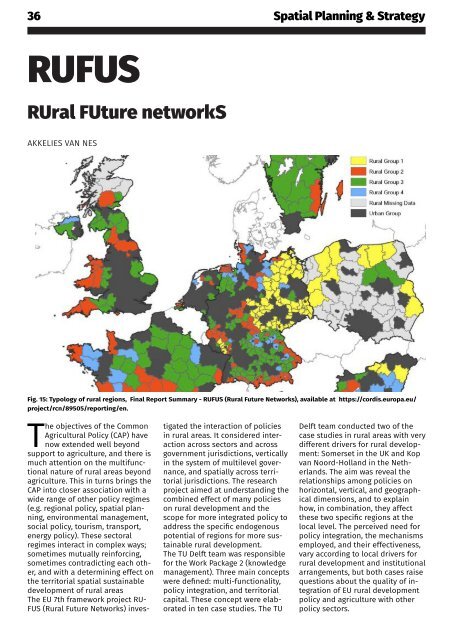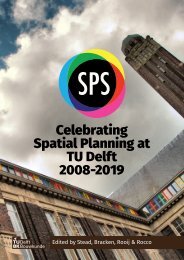*Celebrating Spatial Planning at TU Delft: 2008-2019. Edited by Stead, Bracken, Rooij & Rocco
This is a summary of the achievements of the session Spatial Planning & Strategy of the Department of Urbanism, Faculty of Architecture and the Built Environment, TU Delft, led by Professor Vincent Nadin between 2008 and 2019.
This is a summary of the achievements of the session Spatial Planning & Strategy of the Department of Urbanism, Faculty of Architecture and the Built Environment, TU Delft, led by Professor Vincent Nadin between 2008 and 2019.
You also want an ePaper? Increase the reach of your titles
YUMPU automatically turns print PDFs into web optimized ePapers that Google loves.
36 <strong>Sp<strong>at</strong>ial</strong> <strong>Planning</strong> & Str<strong>at</strong>egy<br />
RUFUS<br />
RUral FUture networkS<br />
AKKELIES VAN NES<br />
Fig. 15: Typology of rural regions, Final Report Summary - RUFUS (Rural Future Networks), available <strong>at</strong> https://cordis.europa.eu/<br />
project/rcn/89505/reporting/en.<br />
The objectives of the Common<br />
Agricultural Policy (CAP) have<br />
now extended well beyond<br />
support to agriculture, and there is<br />
much <strong>at</strong>tention on the multifunctional<br />
n<strong>at</strong>ure of rural areas beyond<br />
agriculture. This in turns brings the<br />
CAP into closer associ<strong>at</strong>ion with a<br />
wide range of other policy regimes<br />
(e.g. regional policy, sp<strong>at</strong>ial planning,<br />
environmental management,<br />
social policy, tourism, transport,<br />
energy policy). These sectoral<br />
regimes interact in complex ways;<br />
sometimes mutually reinforcing,<br />
sometimes contradicting each other,<br />
and with a determining effect on<br />
the territorial sp<strong>at</strong>ial sustainable<br />
development of rural areas<br />
The EU 7th framework project RU-<br />
FUS (Rural Future Networks) inves-<br />
tig<strong>at</strong>ed the interaction of policies<br />
in rural areas. It considered interaction<br />
across sectors and across<br />
government jurisdictions, vertically<br />
in the system of multilevel governance,<br />
and sp<strong>at</strong>ially across territorial<br />
jurisdictions. The research<br />
project aimed <strong>at</strong> understanding the<br />
combined effect of many policies<br />
on rural development and the<br />
scope for more integr<strong>at</strong>ed policy to<br />
address the specific endogenous<br />
potential of regions for more sustainable<br />
rural development.<br />
The <strong>TU</strong> <strong>Delft</strong> team was responsible<br />
for the Work Package 2 (knowledge<br />
management). Three main concepts<br />
were defined: multi-functionality,<br />
policy integr<strong>at</strong>ion, and territorial<br />
capital. These concept were elabor<strong>at</strong>ed<br />
in ten case studies. The <strong>TU</strong><br />
<strong>Delft</strong> team conducted two of the<br />
case studies in rural areas with very<br />
different drivers for rural development:<br />
Somerset in the UK and Kop<br />
van Noord-Holland in the Netherlands.<br />
The aim was reveal the<br />
rel<strong>at</strong>ionships among policies on<br />
horizontal, vertical, and geographical<br />
dimensions, and to explain<br />
how, in combin<strong>at</strong>ion, they affect<br />
these two specific regions <strong>at</strong> the<br />
local level. The perceived need for<br />
policy integr<strong>at</strong>ion, the mechanisms<br />
employed, and their effectiveness,<br />
vary according to local drivers for<br />
rural development and institutional<br />
arrangements, but both cases raise<br />
questions about the quality of integr<strong>at</strong>ion<br />
of EU rural development<br />
policy and agriculture with other<br />
policy sectors.




